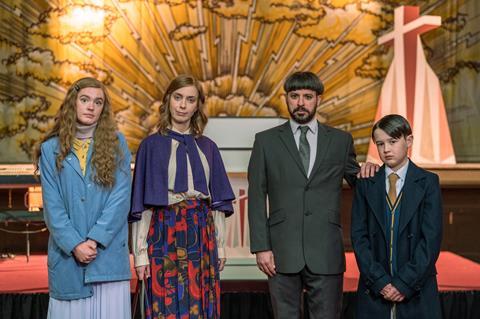The new Channel 4 comedy series Everyone Else Burns portrays fundamentalist religion at its worst, but could it help Christians understand how outsiders view the Church?

Everyone Else Burns is a new Channel 4 comedy about the Lewis family who are devoted followers of a ‘puritanical Christian sect’ called the Order of the Divine Rod.
The dad, David (Simon Byrd), is a weapons-grade self-righteous pharisee, desperate to become an elder in the sect. He has been keeping his family in a permanent state of fear – of him and the judgement to come, which could be any day now.
In fact, the show begins with a midnight drill in which the family hike to the hills where they will watch everyone else burn. David’s son, Aaron, is sociopathically excited about this, being a young boy who is clearly very lonely and very angry.
But the star of the show, and the one we are all rooting for is Rachel (Amy James-Kelly), who is coming of age, and keen to study medicine at university, encouraged by her teacher Miss Simmons (Lolly Adefope). Through her enforced door-knocking evangelism, she meets Joshua, a good-looking guy to whom she is clearly attracted. But he is an ex-member of the sect who must be shunned. Will she follow her heart? Or will she obey her hopelessly pompous father?
Should I watch Everyone Else Burns?
In some ways, I can see why Everyone Else Burns might hold little appeal for Christians. As if the title were not off-putting enough, the show strongly implies that religious people are full of glee that their unbelieving friends and family will be subjected to eternal conscious torment.
I can understand why some Christians would be reluctant to invest in this series. The show is co-written by Dillon Mapletoft who says he was brought up as ‘fundamentalist Christian’. What that means exactly is unclear since many will know that fundamentalism is a particular expression of an evangelical Christian faith. And what about the 'puritanical Christian sect' depicted? As a fan of the Puritans, many of whom were loyal Anglicans, I baulk at this description too.
But the religion portrayed in the show is not puritanical Christian fundamentalism. For a start, it’s called the comically silly Order of the Divine Rod. It is, after all, a comedy. And there are jokes. In fact, the sect doesn’t look very Christian at all. Jesus is barely mentioned, and the obsession with End Times gives the impression this is a Branch-Davidian style cult. As the show unfolds, we see absurd bans on hot drinks and caffeine and the requirement of door-knocking. We’re firmly in the territory of the Mormons and Jehovah’s Witnesses.
Secular saviours
I have grave reservations about both Mormonism and Jehovah’s Witnesses, so I’m rooting for the character Rachel to escape. But what is the solution being offered to her? Not true, grace-filled, Christ-centred faith – but secularism. Ice-cold, lonely secularism.
In episode 2, we see Rachel counselled by her desperately lonely school teacher who encourages her to get a phone to the ‘outside world’. She is then given one by equally lonely ex-sect member Joshua. Rachel’s mother, Fiona (Kate O’Flynn), is mentored by a neighbour who is thrilled at her divorce. Divorce is devastating. Is she in denial? David visits a confused and isolated young man. The show is commendably honest that life outside a religious group can lead to loneliness and brokenness.
In which case, it would be helpful to establish a counter-narrative in order to explain the appeal of the Order of the Divine Rod – to show that David’s family does at least provide some kind of reassuring familiarity and security. After all, what is the one thing that sects, cults and, indeed, regular churches all offer? Community. Friendship. Support networks. Even non-religious conspiracy theorists experience a sense of camaraderie with fellow travellers who have also ‘taken the red pill’, or looked behind the curtain and realised that all we see is smoke and mirrors. A sect of any kind can be very attractive to someone lost in our individualised, atomised society based on autonomy and freedom.
Everyone Else Burns, however, portrays a religious sect that has zero upsides, so the fact it attracts dozens of members doesn’t add up. What are these people getting out of it? Aside from community, sectarian groups are often under the spell of a charismatic leader or a powerful narrative and founding myth. The Order of the Divine Rod is run by feckless and cynical young men with very little to offer.
But here’s why you should give Everyone Else Burns a go. If you’re part of any church, it’s worth watching an episode or two and asking yourself the question: “Is this how we look to the outside world?” It might help us understand why refugees from our loveless, disembodied society are not streaming into Christ-proclaiming churches to experience true fellowship, forgiveness and rest.
The six-part comedy series Everyone Else Burns is available to watch now on Channel 4 and All 4





































1 Reader's comment